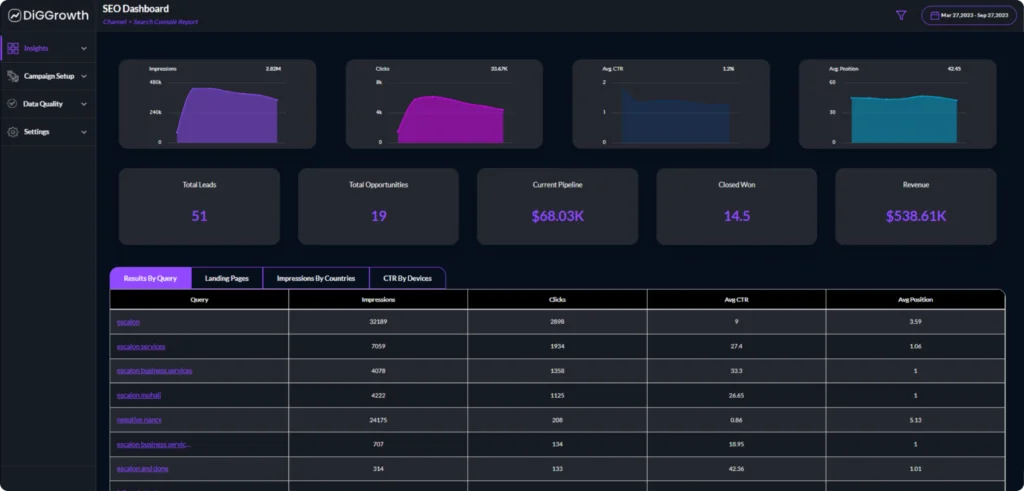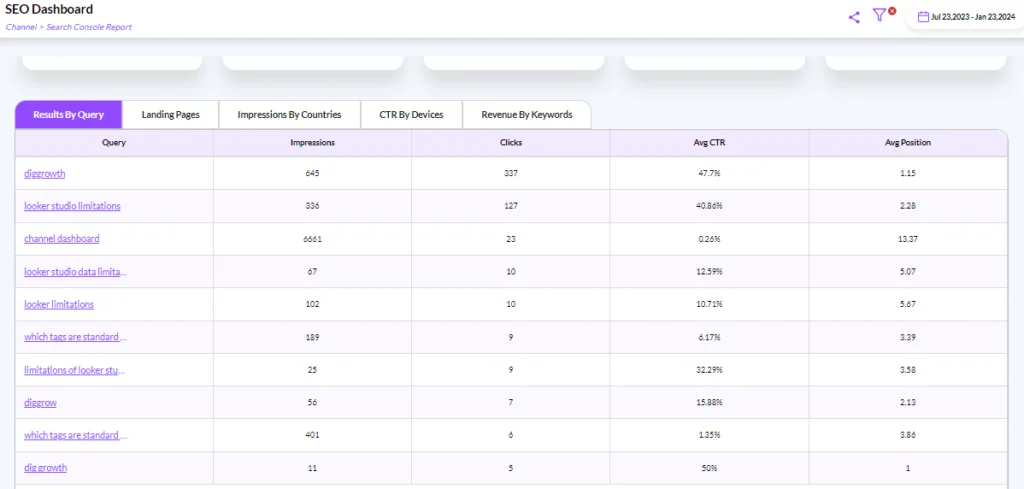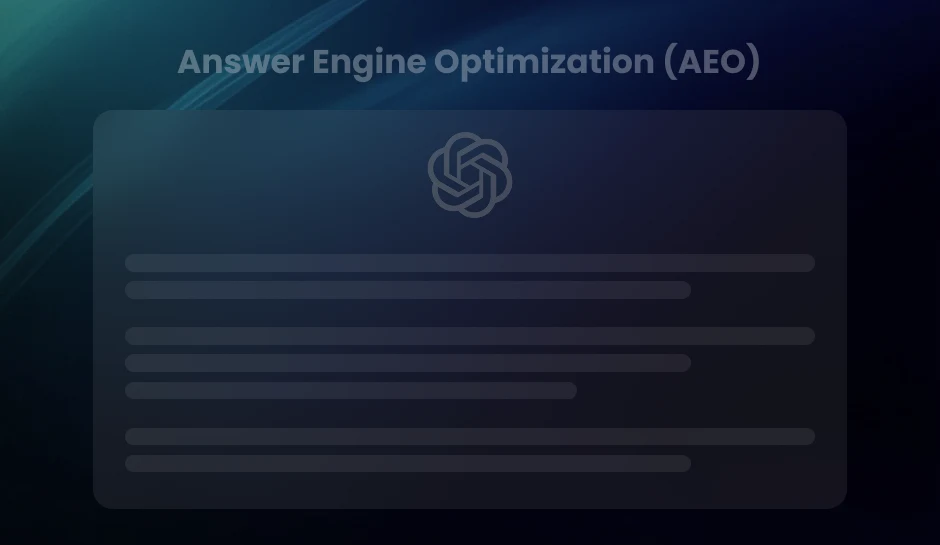
Effective SEO Dashboard: Track Key Metrics for Success
SEO Dashboard: Marketers face daily challenges in effectively managing and enhancing a website’s search engine optimization while juggling multiple tools to monitor performance. In this blog post, we discuss how an SEO dashboard streamlines the process by making it easier to track and analyze keyword rankings, backlink profiles, website traffic, and more.
In today’s digital age, tracking KPI’s and metrics has been an essential key factor for marketers as it allows your marketing team to analyze SEO efforts.
However, the world of SEO is complex, ever-evolving, and data-driven. To effectively manage and optimize your SEO efforts, you need a reliable tool to centralize and visualize critical data. That’s where an SEO dashboard comes into play.
It comprises a widget collection that showcases summaries of the most significant and commonly utilized performance metrics.
In this blog post, we’ll explore an SEO dashboard, why it is essential, and how to use it effectively to boost your website’s search engine rankings and overall online success.
What is a SEO dashboard?
An SEO monitoring dashboard is a platform that offers an organized way to monitor, analyze, and optimize your website’s SEO performance. It combines all the data and key metrics you need to decide and boost your search engine rankings. These dashboards gather data from various sources, such as Google Analytics, Google Search Console, and other SEO tools, and present it in a user-friendly format. The goal is to simplify monitoring your website’s SEO performance, allowing you to make data-driven decisions to improve your rankings and traffic. Here’s why you need an SEO Marketing Dashboard.
Visualization and Reporting of Data in SEO Dashbaord

An SEO ranking dashboard consolidates all SEO data into one user interface. You can swiftly analyze complex information through charts, graphs, and tables, leading to better strategic planning and implementation.
Real-time Monitoring in SEO Dashbaord
SEO monitoring dashboards can provide real-time or near-real-time data, allowing you to spot trends and respond quickly to any issues or opportunities.
Performance Tracking in SEO Dashbaord
You can track your website’s performance over time, comparing past and current data to assess the impact of your SEO efforts.
Customization in SEO Dashbaord
SEO marketing dashboards are often highly customizable seo dashboard, so you can focus on the metrics that matter most to your goals.
Track all Importance KPI’s using SEO Dashboard Let’s Talk!
If you need any help setting up your SEO dashboard, our experts will be happy to assist you. Just drop us a line at info@diggrowth.com and we’ll take it from there.
How to create an SEO Dashboard?
With an overview of your website’s SEO performance available through a customizable SEO dashboard, you can make well-informed decisions and develop effective strategies.
By understanding metrics like organic traffic keyword rankings and backlinks, you can pinpoint areas that require improvement and take appropriate actions.
Say goodbye to the days of gathering and analyzing data from sources. An SEO ranking dashboard automates the process of collecting data. Seamlessly integrates information from tools and platforms, saving precious time and effort. It empowers you to focus on comprehending and implementing the insights by spending hours on data collection and organization.
Features of SEO Dashboard
A customizable SEO dashboard is a robust tool for website owners and digital marketers. It condenses complex data into a visually appealing and easy-to-understand format. The following are essential features that make an SEO dashboard invaluable:
- Integration With SEO Tools and Platforms
- Customizable Data Widgets and Visualizations
- Real-Time Monitoring and Alerts
An ideal SEO marketing dashboard should integrate with SEO tools and platforms, allowing you to gather data from various sources. This integration ensures you have a view of your SEO efforts, enabling you to make decisions based on reliable data.
A good customizable seo dashboard software should offer data widgets and visualizations that allow you to organize and present your data meaningfully for yourself and your team. This flexibility ensures that you can easily analyze the data, uncovering insights for decision-making.
Another crucial feature of SEO dashboard software is real-time monitoring capabilities and alerts that keep you updated on changes or developments.
This feature enables you to stay up to date with the progress of your SEO campaigns and receive notifications if any issues arise. Real-time monitoring helps you quickly identify and resolve problems, ensuring the success of your SEO efforts.
A user-friendly interface and ease of use are aspects of an SEO dashboard. It should have a design that allows you to navigate and understand the information it provides easily. This feature ensures you can efficiently manage your SEO campaigns and make informed decisions.
Pro Tip- Track all your SEO Analytics KPIs in one place. Signup For Free Trial
Key Factors and the Best Practices for SEO dashboard
By incorporating the following factors and the best practices, you can enhance your website’s SEO, boost organic traffic, and improve your online visibility.
- Keyword Selection:
- On-Page Optimization:
- Backlinks:
Choosing and incorporating keywords strategically into website content for SEO. Keywords are the words and phrases that users type into search engines when searching for information or solutions.
To enhance search engine comprehension of the content on the page, elements like tags, headings, and image alt tags should be optimized. This optimization increases the likelihood of achieving rankings in search results.
Backlinks, also known as links, refer to links from websites that direct users to your website. Search engines view backlinks as a vote of confidence, so having quality and relevant backlinks can greatly boost SEO.
Top SEO metrics to track for KPI-driven marketers and CMO’s
Tracking SEO metrics is crucial, but it does come with its own set of challenges. Some common issues include:
- Data Accuracy:
- Attribution Modeling:
- Keyword Ranking Fluctuations:
- Ever-Evolving Search Engine Algorithms:
- Competitive Landscape:
- User Behavior Changes:
Ensuring that the data collected is accurate and reliable can be a challenge. Changes in search engine algorithms, updates to tracking tools, or technical issues on the website can impact the accuracy of the metrics.
Determining which actions or channels contribute most to conversions can be complex. Attribution Modelling can be challenging for specific results, especially in the presence of other marketing activities.
Search engine algorithms are dynamic, leading to fluctuations in keyword rankings. This can make it challenging to assess the effectiveness of specific SEO strategies over short periods.
Search engines regularly update their algorithms, affecting how websites are ranked. Staying updated and adjusting strategies accordingly is an ongoing challenge for SEO professionals.
The SEO landscape is competitive, and changes in competitors’ strategies can impact your own performance. Keeping an eye on competitors and adjusting strategies is essential.
Shifts in user behavior, such as changes in search queries or preferred devices, can impact SEO metrics. Adapting to these changes requires continuous monitoring and adjustment.
Overcoming these challenges involves a combination of staying informed about industry trends, using reliable tracking tools, and regularly reassessing and adjusting SEO strategies based on the evolving landscape.
Using Website Analytics to Assess Traffic
Website analytics tools provide insights into aspects of your traffic data. By examining metrics like session duration, conversion rates, and exit pages, you can identify areas for improvement. Optimize your website’s performance.
Understanding Different Sources of Traffic (paid, referral, direct)
It is essential to comprehend the sources that contribute to your website’s traffic to gauge the effectiveness of your SEO strategies. Organic traffic refers to visitors discovering your website through search engine results, while paid traffic originates from advertisements. Links from websites generate referral traffic, and direct traffic represents visitors who directly enter your website’s URL.
Examining these traffic sources lets you determine which channels attract the most valuable visitors. This knowledge enables you to allocate resources efficiently and focus on the sources that provide the return on investment.
Identifying Metrics for SEO Analysis (Sessions, Bounce Rate, Conversion Rate)
Sessions, bounce rate, and conversion rate are metrics for evaluating the effectiveness of your SEO endeavors. Sessions represent the number of visits to your website, while the bounce rate indicates the percentage of visitors who leave after viewing one page. The conversion rate indicates how many visitors complete a desired action, like purchasing or filling out a form. By using Google Analytics to track these metrics, you can gain insights into the effectiveness of your SEO strategy.
Top 5 Metrics to Track on Your SEO Dashboard:
- Organic Traffic:
- Keyword Rankings:
- Backlink Quality:
- Conversion Rates:
- Page Load Time:
Measure the quantity and quality of visitors arriving at your site through organic search. It’s a key gauge of how visible and relevant your website is in the online space.
Keep tabs on where your chosen keywords stand on search engine results pages (SERPs). This tracking offers valuable insights into the efficiency of your SEO strategies.
Evaluate the quality and quantity of backlinks directed to your site. Quality backlinks from authoritative sources boost your website’s authority and search engine rankings.
Assess the percentage of visitors taking desired actions, like making a purchase or filling out a form. Conversion rates reflect the effectiveness of your content and user experience.
Monitor the speed at which your pages load, directly impacting user experience. Given search engine preferences for fast-loading sites, optimizing page load times positively influences SEO performance.
Leveraging Google Analytics for SEO Insights
Google Analytics allows you to track user behavior on your website, providing information on how visitors interact. You can analyze the pages they visit, their time on each page, and their actions. This data is crucial for understanding user intent and optimizing your website’s content and design to improve its performance in search engine rankings.
Utilizing Google Search Console for SEO Monitoring

Google Search Console is an SEO monitoring dashboard that plays a role in optimizing your website for search engines. It offers insights and data to help you monitor and enhance your SEO efforts.
One of the SEO dashboard features of Google Search Console is analyzing your website’s search performance and keyword rankings. By accessing the Search Performance report, you can understand how well your website appears in search engine results pages (SERPs), including metrics such as impressions, clicks, and average position for your keywords.
You can determine which keywords drive traffic to your website using this information. It’s important to focus on optimizing your content to improve your ranking. You can also identify keywords with a click-through rate. Work on enhancing your meta descriptions and titles to make them more appealing to users.
Moreover, Google Search Console offers insights into your website’s crawlability and indexing status. It notifies you about any errors or issues affecting your website’s visibility in search results. Regularly monitoring these reports allows you to swiftly identify and resolve SEO problems like links or duplicated content.
Another way to leverage Google Search Console as an SEO ranking dashboard is by gathering data for on-page optimization. By analyzing the Search Analytics report, you can discover the keywords users use to discover your website. This information helps you optimize your pages by incorporating these keywords into your content, headers, and meta tags.
Furthermore, Google Search Console provides data on how your website performs on devices. Given the increasing significance of search, your website must be mobile-friendly. By identifying any usability issues, such as loading times or layout problems, you can make necessary improvements to enhance the user experience.
Google Search Console is a Analytics tool for monitoring and improving the performance of your website’s SEO. By utilizing its seo dashboard features, you can gain insights, optimize your content, and ensure that your website is well-optimized for search engines, ultimately increasing your organic traffic.
Also See
Integrating SEO Tools for Comprehensive Analysis
To fully maximize the potential of your SEO dashboard, it’s crucial to integrate SEO tools. This integration allows for an analysis that provides insights into your website’s performance. Here are two key aspects to consider when integrating SEO tools for an analysis:
- Integrating SEO Tools With the Dashboard
- Utilizing Keyword Research Tools for Data-Driven SEO Strategies
- Enhancing Your SEO Performance Involves Analyzing Backlinks and Competitor Data
Integrating SEO tools with your SEO ranking dashboard saves time and provides a view of your website’s overall SEO performance. With this integration, you can easily track metrics such as traffic, keyword rankings, and backlink profiles without switching between multiple platforms.
Keyword research plays a role in SEO practices. Integrating keyword research tools with your dashboard can greatly enhance your SEO strategies and decision-making processes.
To optimize your website and improve its visibility, it is important to utilize keyword data. This will allow you to identify keywords, explore long-tail opportunities, and tailor your content accordingly.
You can gain an edge by utilizing SEO dashboard features that provide insights into backlink profiles and competitor strategies. This analysis helps identify links that should be disavowed while building high-quality ones. Additionally, monitoring your competitors’ SEO strategies and performance enables you to pinpoint areas for improvement and refine your strategies accordingly.
Performance Monitoring and Reporting
Monitoring and reporting play a significant role in optimizing website performance. By setting performance goals and key indicators, you can track progress. Make decisions based on data.
Regularly analyzing SEO metrics through a customizable SEO dashboard allows for identifying areas that require improvement. It includes monitoring traffic keyword rankings, backlinks, and other factors influencing website performance.
However, more than merely monitoring is required. To effectively communicate your SEO efforts to stakeholders, generating reports is crucial.
These reports offer stakeholders an understanding of how your SEO performance impacts business goals.
You can highlight the importance of performance monitoring and reporting by utilizing tags that showcase their value to your SEO strategy.
Conversion Tracking and Analysis
Utilizing conversion tracking SEO monitoring dashboards like Google Analytics to track user actions that lead to conversions is essential. By implementing conversion tracking codes on your website, you can monitor user interactions such as clicks, form submissions, and page visits. These interactions play a role in driving conversions. Provide valuable insights into user behavior. Analyzing the data gathered from conversions helps optimize your SEO strategy.
Tracking User Actions and Conversion Events
Examining conversion data plays a significant role in improving your SEO performance. By studying the data, you can identify patterns, trends, and areas for improvement. For example, if you notice that a particular page on your website generates several conversions, you can analyze its content and structure to replicate its success across pages. You can also identify any obstacles or friction points in the conversion process. Make adjustments to enhance the overall user experience.
Analyzing conversion data and enhancing content to improve conversions
Enhancing your content to drive conversions involves implementing techniques such as making your call to action clear and persuasive, streamlining website navigation for ease of use, and elevating the user experience. By analyzing and optimizing your content based on conversion data insights from your SEO marketing dashboard, you attract traffic to your website and maximize your SEO efforts.
Case Study: Transforming Back-Office Excellence
Challenge:
A leading firm with a legacy of over 500 years of collective expertise in accounting, taxes, compliance, and payroll sought to revolutionize its market presence. Despite their extensive industry knowledge and impeccable services, they faced the challenge of not being adequately recognized in the digital space. Their goal was to leverage technology to showcase their expertise, increase brand visibility, and attract a broader clientele.
Solution:
Understanding the need for a robust online strategy, they partnered with DiGGrowth’s, a cutting-edge SEO platform. The collaboration aimed to enhance the company’s digital presence, drive organic traffic, and position them as industry leaders. The seamless integration of the SEO dashboard tool allowed to monitoring and optimizing various aspects
Results:
- Increased Online Visibility:
- Lead Generation:
- Revenue Growth:
- Thought Leadership Recognition:
They witnessed a substantial increase in online visibility, with their website appearing prominently in search engine results for relevant industry queries.
The strategic use of SEO led to a significant uptick in organic traffic, translating into a higher number of qualified leads seeking specialized services.
By adopting a revenue-focused approach through the SEO dashboard tool, They not only established themselves as industry leaders but also experienced a notable increase in revenue through new client acquisitions.
The curated content and optimized online presence positioned them as a thought leader in the accounting, taxes, compliance, and payroll space, further enhancing their credibility.
Conclusion
SEO dashboard is an indispensable tool for website owners, marketers, and SEO professionals. It provides a clear, centralized view of your website’s performance, helping you make data-driven decisions and optimize your online presence. By defining your goals, choosing the right data sources, and regularly analyzing your dashboard, you can take your SEO efforts to the next level, ultimately driving more organic traffic and achieving your online objectives. Leverage the unbound benefits an SEO Dashboard offers with DiGGrowth. Feel free to write to us at info@diggrowth.com to learn more.
Ready to get started?
Increase your marketing ROI by 30% with custom dashboards & reports that present a clear picture of marketing effectiveness
Start Free Trial
Experience Premium Marketing Analytics At Budget-Friendly Pricing.

Learn how you can accurately measure return on marketing investment.
Additional Resources
From Demos to Deployment: Why MCP Is the Foundation of Agentic AI
A quiet revolution is unfolding in AI. And...
Read full post postAnswer Engine Optimization (AEO): The New Frontier of SEO in 2025
As digital experiences continue to evolve, so does...
Read full post postIntegrating Data from Different Channels for a Holistic View of Your Marketing Performance
Who's your ideal customer? Where do they come...
Read full post postFAQ's
(a) Define Objectives: Clearly outline your SEO objectives and what you aim to achieve with the dashboard. This could include goals like increasing organic traffic, improving keyword rankings, or enhancing user engagement. (b) Choose Relevant Metrics: Identify and prioritize key metrics that directly align with your defined objectives. Common metrics include organic traffic, keyword performance, backlink quality, and conversion rates. (c) Select Appropriate Tools: Choose tools or platforms that cater to your specific needs and allow for seamless integration of the chosen metrics. Popular tools include Google Analytics, SEMrush, Moz, and other SEO analytics platforms.
An effective SEO dashboard can positively impact website performance by providing actionable insights into key metrics such as organic traffic, keyword rankings, and user engagement. It enables data-driven decision-making, identifies areas for improvement, and helps optimize strategies to enhance overall search engine visibility and user experience.
While Creating SEO Dashboard include organic traffic, click-through rates (CTR), keyword rankings, bounce rate, and user engagement metrics. Monitoring these metrics allows immediate adjustments, optimizing SEO strategies for better performance.
(a) Define Objectives: Clearly outline SEO goals and objectives. (b) Choose Metrics: Select relevant metrics aligned with goals. (c) Select Tools: Choose suitable platforms for dashboard creation.
 Rahul Saini
Rahul Saini  Sameer Pawar
Sameer Pawar 

